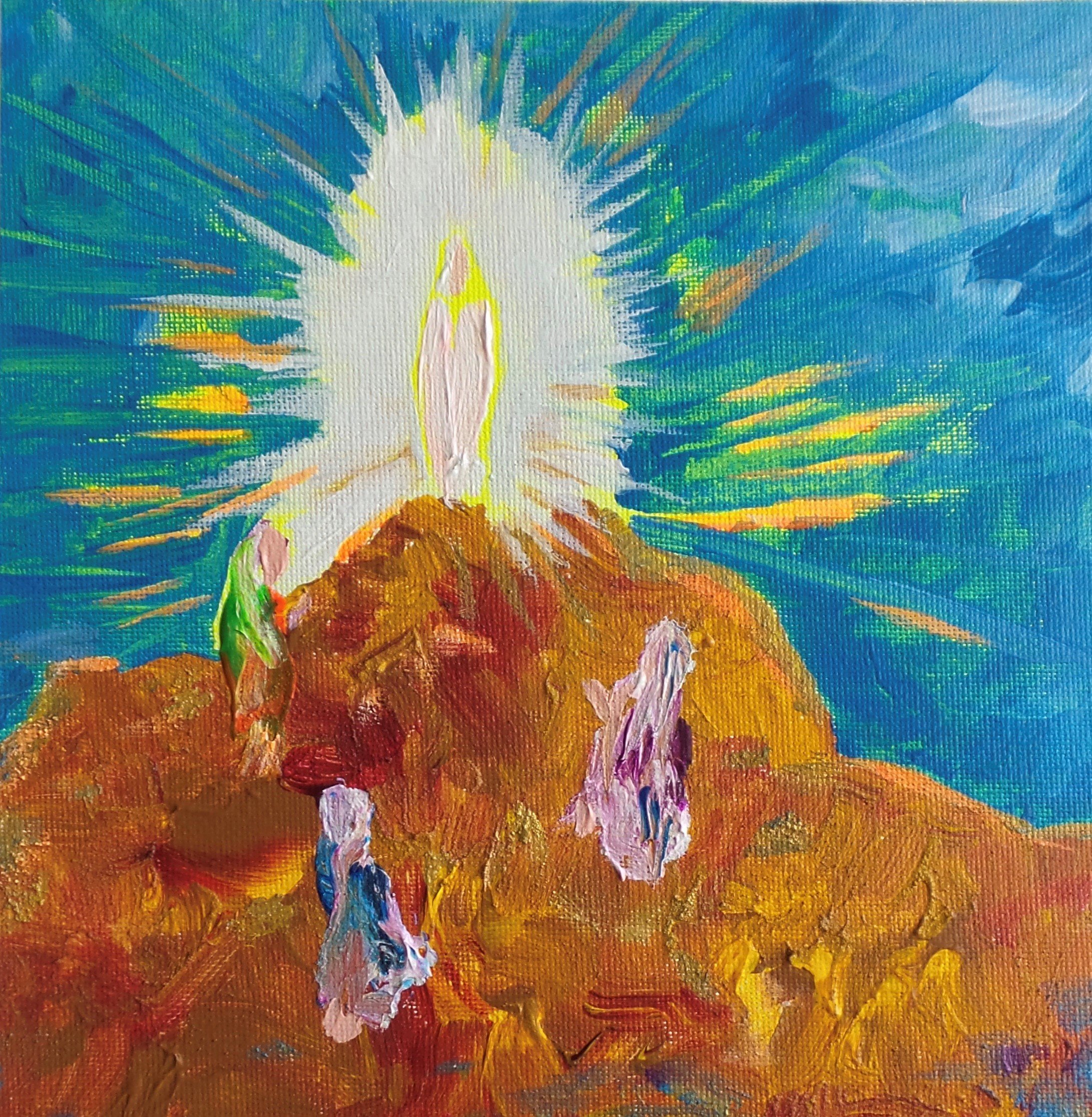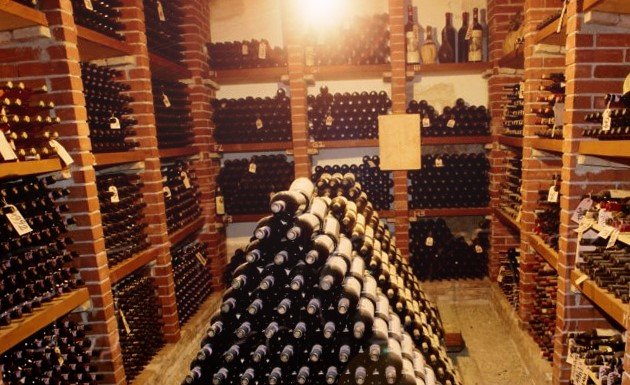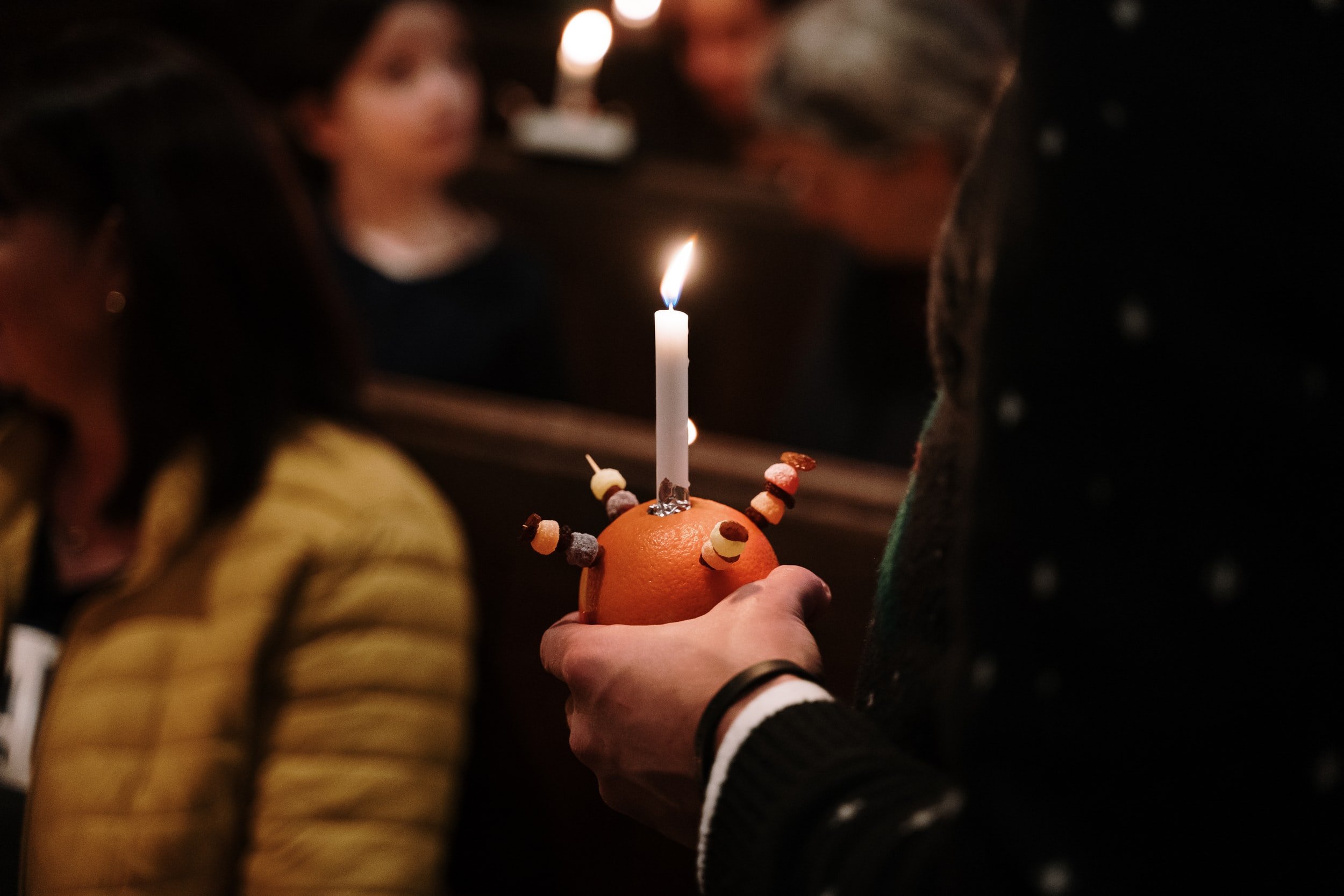
Sunday next before Lent (The Transfiguration)
It is easy to be blinded by light. This week’s gospel falls into two distinct halves: the first half, at the top of the mountain, is the shiny half: dazzling clothes, shining faces, voices booming from clouds, the sudden appearance of long-dead heroes of the faith. The second half is less dazzling. Jesus and his disciples trudge down the mountain to confront chaos, failure and brokenness. The disciples wanted to stay at the top basking in the light, but the difference between this reading, Luke 9: 28-43, and the first reading, Exodus 34:29-35, is that God comes to us, not us to God. God shows up in the mess and the struggle and it is here, not on the mountain top, that the true glory of God is revealed.


Second Sunday before Lent
Last week Jesus invited us to stand on “level place” with him: encouraging us to step down when we find ourselves above others and to step up when we find ourselves beneath others. This week it looks as though we are being urged only to step down, to take the lower place. In our Old Testament reading, Genesis 45:3-11, 15, Joseph is not seeking revenge, but only reconciliation with his brothers. He does not hold them responsible for their actions against him. In our gospel, Luke 6:27-38, Jesus urges us to turn the other cheek, walk the extra mile, give the shirt from our backs. Such texts need to be handled carefully. They can be, and have been, used to exhort the downtrodden to stay down. In their own context though they offer something subversive: a Roman soldier could make a Hebrew carry his pack for one mile but not two, could take his cloak but not his shirt. By giving more, Jesus' hearers were engaging in civil disobedience, revealing the injustice at the heart of the law. To be generous in the face of greed, to love in the face of hate, is to refuse to be defined by that injustice, but instead to commit to a different way of life.

Third Sunday before Lent
Both of our readings (Jeremiah 17:5-10, Luke 6:17-26) today imagine a great reversal: the hungry are now full, the rich are now poor, the bottom is now the top, and the top is now the bottom. I can see that such a vision can be helpful: it may give comfort to those who have little with the promise of future plenty, and it may prick the consciences of those who have more to make that future happen. One thing it does is to undermine the common view (then and now) that we are responsible for our own fate, that we deserve what we get; if we are poor or in trouble we only have ourselves to blame, whereas if we enjoy security and plenty we must have earned it. I am still left uncomfortable with the idea that anyone should be on top or anyone on the bottom, and this may be where the Beatitudes are leading us: should there be a top and a bottom? Would it be possible to imagine a world in which there are no rich or poor, no powerful or powerless? What would such a world look like? What do we need to do to stand with Jesus “on a level place”?

Fourth Sunday before Lent
These days everything seems to be running out: public finance, oil and gas, healthcare and social support, even wellbeing and goodwill seem to be in short supply. We look upon the world around us as a place of scarcity: whether it’s jobs, doctors’ appointments, truck drivers or natural gas – there just doesn’t seem to be enough of it. In today’s gospel, Luke 5:1-11, the fishermen at the shore have empty nets, they have worked all night and have nothing to show for it. And then miraculously, along comes Jesus and, boom, their nets are filled with a superabundance of fish. Such abundance that they can barely bear the weight of it. This seems too good to be true; the kind of miracle stories that have no relevance to us once we leave Sunday School. Looking at this familiar story afresh this week I am struck, not so much by the abundance, as by the efforts made by the community. The decision to put out to sea again, to commit yet more scarce resources to an uncertain venture, is made together. Not just by the crew of one boat but by many; the catch, when it comes, is landed by many boats. What Jesus gives to this community is the imaginative vision to take the risk but they have to do it together, all hands on deck, literally. How can this story bring us to look at the world around us as a place of abundance not of scarcity? Perhaps, the truly abundant resource here is the community. The planet may well be running dry of oil and gas and the public coffers running dry of credit, but we are not running out of people. What we need is the imagination and the vision to take the risk of pooling our resources and striving together for something better than our individual security.

Candlemas (Presentation of Christ in the Temple)
Today we celebrate the feast of Candlemas which marks the end of Epiphany. This is the day we take the Nativity scene out of the church and process with candles: symbolising that God is no longer separate from us; we too can bear Christ’s light in the world. The first reading, Malachi 3:1-5, describes how when God comes to earth it will be with awe and terror. God’s presence is seen as a fire that will purify the people, burning away their impurities. In the gospel, Luke 2:22-40, however, God is no longer terrifyingly “other”. Mary and Joseph come to the temple with Jesus just like would the parents of every other new child; yet Jesus is recognised as unlike every other child. Here we have a meeting of opposites: old and young, male and female, divinity and humanity. In Christ heaven and earth meet and all things are reconciled.

Third Sunday of Epiphany
This week’s scripture readings are all about reading scripture: in Nehemiah 8:1-3, 5-6, 8-10, the word of the Lord is interpreted for the people and they weep. This is sometimes put down to remorse at their previously less than ideal behaviour, but it could be that they are weeping because the scripture has been interpreted so harshly. In the previous chapter they have been told that keeping the word of the Lord necessitates them divorcing their wives and dispossessing their children if they had any “foreign” blood. In contrast Jesus, in Luke 4:14-21, does not interpret the scriptures, instead he fulfils them. His scripture is a word of liberation. It is challenging. Yes, it questions existing structures, but in a way that leads to inclusion not exclusion, the widening not the narrowing of God’s welcome. When our faith leads to harm to human wellbeing and relationship we maybe need to question how we are interpreting God’s word. When our lives and communities lead to human flourishing and liberation then God’s word is fulfilled and Christ becomes present.


Second Sunday of Epiphany
January is always a hard month for me; the excitement of Christmas is over, the days are short, the nights are long, energy and bank balances are low. So the super abundance, resources, and the excess of joy in our readings this morning feels hard to connect to. In Isaiah 62:1-5 the people of God are told of a future time when they will be a crown of beauty, renamed My Delight is in Her. But for now they are desolate and forsaken. They cannot envisage how they will get from desolation to delight and this is really the point: In John’s gospel (John 2:1-11) Jesus performs his first ever miracle by turning water, gallons of it, into the best wine, but the jars start out empty, they do not even contain water. It is often only when we have run dry, when our own resources have been exhausted, that we allow God the space to do anything at all. And that anything at all is so often more than we could ever have hoped for.

Baptism of Christ
'Epiphany’ is a Greek word meaning ‘manifestation’, ‘appearing’, or ‘revelation’. Each week in this season we have a story which reveals something more of the meaning and purpose of the Incarnation which we celebrated at Christmas.

The Epiphany
As the festive season draws towards its end and a new year begins, we reflect upon the meaning of the Epiphany. Twelve days after the birth of Christ, God revealed Himself to the Gentiles in the form of his only son.

Boxing Day Mass
This year the first Sunday of Christmas falls on Boxing Day. We will not be holding our usual Sunday services but we shall celebrate a short said mass in church at 10.30am.


Christingle Service
At 4pm on Christmas Eve church is transformed for our family Nativity service, complete with readings, carols and a full cast of characters in costume.

Traditional Service of Lessons and Carols
On Sunday 19th December at 6.30pm, make a bee line for church for a traditional service of lessons and carols.
There is no better way to be reminded of the importance of the Nativity than through this familiar selection of readings and music.

Fourth Sunday of Advent
In our last Sunday before Christmas we are given a glimpse of something truly radical. Our texts are still facing doom and disaster: in our first reading, Micah 5:1-5, the little nation of Israel is under siege, humiliated and oppressed by its mighty neighbours; in the Gospel, Luke 1:39-55, Mary, poor, disgraced and possibly in fear of her life, is running away. Yet here is hope in the face of hopelessness. And the hope comes not from the strong and the powerful but from the poorest and the weakest. In response to Elizabeth’s welcoming embrace Mary lets loose a song of revolution: if God is in her womb, then the world is truly turning upside down. A future of justice and peace will be brought forth by the little and the lowly, and Bethlehem, the most insignificant town in the most insignificant nation, will be the birth place of a new way of living with power to transform our world.

Carols by Candlelight
What could be more festive than carols by candlelight?
Bring the whole family down to church on Sunday 12th December at 4pm and prepare yourselves for the celebrations ahead!
No previous carol singing experience required!

Third Sunday of Advent
Good news? What good news? We are now well into Advent and the themes of judgment and repentance are growing louder. John the Baptist, Luke 3:7-18, starts by calling us a brood of vipers and ends with a warning that on the day of judgment the chaff will be burnt with an unquenchable fire; which doesn’t sound very good newsy to me. But judgment always comes joined with the assurance of forgiveness. The word of judgement is always a word of salvation, it shows us where we are going wrong and how we can change for the better. John gives specific advice to his hearers: share with one another, do not abuse your power, use your position to the benefit of those around you. Judgment is hard to hear but it is ultimately liberating, bringing with it the chance of being restored into a joyful relationship with God, one another and the whole of creation, poetically imagined by Zephaniah 3:14-20.

Second Sunday of Advent
In Advent, the season of looking forward, the season of hope, we hear of a time when the people of God, like us, were longing for change and the word of the Lord came to them. Our reading, Luke 3:1-6, begins with a list of all those who held power and authority: an emperor, a governor, three tetrarchs and a high priest. But the word of the Lord does not come to any of them. It comes to John in the wilderness. John has left the centres of power behind searching for god knows what. It is here, in the middle of nowhere, in a place of vulnerability and uncertainty, that John hears God’s voice. The voice tells him that God will come, that God is coming, that change is possible, and asks him to prepare the way, to call for change. In a world of vulnerability and uncertainty change is often the last thing we want yet is the one thing we can count on. Are we ready to embrace it?

First Sunday of Advent
Advent Sunday: Today is New Year’s Day in the life of the church. We begin the year by looking to the end; the end of all years and all time. We look to the promise that we have been given that the world will be made afresh; that all that is broken will be healed; all that is crushed will flourish. It is a season of hope and expectation.
Our gospel reading this morning, Luke 21:25-36, may not seem that hopeful at first glance; it speaks of distress, confusion and fear. Whether we are at the beginning, at the end or somewhere in between, no life is free of distress, confusion or fear. But our hopefulness, our belief in what is possible, shapes how we respond. Christ tells us we are to stand up, raise our heads, and look for the signs of the kingdom that are surely springing up around us.
